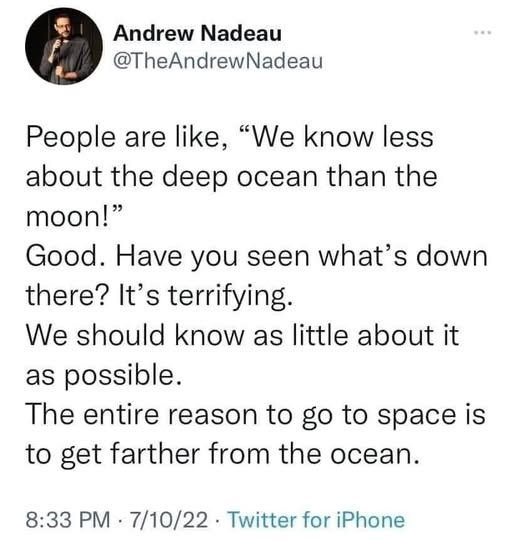While this is funny and all, this isn't really true for a couple of reasons:
- We know a hell of a lot about the oceans, we've studied them for hundreds years. There has been extensive mapping of the seafloor. All of the areas close to land have been thoroughly studied. And where we've spotted interesting stuff, we've investigated for sure.
- We haven't thoroughly explored the moon. Sure we've had nice pictures for a long time. But we've only recently seen the rear side of the moon, as we more or less always see the same side from Earth. Not till recent orbiters we've had a high resolution map of the moon, comparable to maps we have of the oceans.
- Only a dozen or so people have ever been to the moon and the amount of research they did was very low. They also haven't brought back many samples. And the amount we can do from orbit and with rovers is very limited. At this point I would say we know more about Mars than we do about the moon, depending on how to count. The moon isn't that interesting, so we haven't done much with it. It's made of the same stuff as the Earth and without an atmosphere and biosphere, it's kinda dull.
- This is basically impossible to measure. What is knowledge? How is it quantified? We could say it's relative. But since there isn't a way to know how much total knowledge there is available to learn, I'd say that's not possible. What does it mean to "explore"? Do people need to go there? Because a hell of a lot of people have been to the seafloor than to the moon. Hell going to the seafloor is a basic tourist activity these days. I've been to the Maldives and did some crazy dives looking at life on the bottom of the sea.
- People might argue the Moon is basically all the same, so once you've seen one spot you've seen them all. I'd argue that's not true, we've only recently learned the moon's poles are very interesting and we know very little about that. And I'd counter that argument with the fact the same goes for the deep oceans. A whole lot of it is just barren wasteland, an under water desert. We haven't explored because there is nothing to see. We select interesting locations and study them thoroughly, instead of studying a lot of it a little bit and wasting huge amounts of time.
- Another argument often repeated is new species are discovered every day in the ocean. Whilst this is true, we are also destroying a lot of species, so the total number might actually go down instead of up. And a lot of species are variants of already known species. Only expert biologists can differentiate between the species and know what to look for. And I'd argue they don't change the big picture or understanding at all. Still interesting, but not an indication there is so much more to find out there.
- But what about something huge living down there? Like a Kraken or dinosaurs? Well no, we don't have to have studied every square inch to know about big life. Big life is messy, requires a lot of resources and is part of a food chain. You don't need to see the dinosaur if you can see their giant mountain of crap amidst broken trees. There might be some kind of large squid or something down there, but they will probably be extremely similar to other large squid we already know about. So a new species, but not changing the overall picture. If there were any big monsters down there, we would know about them by now.
So this is one of those things that might feel true, but in reality it really isn't.

